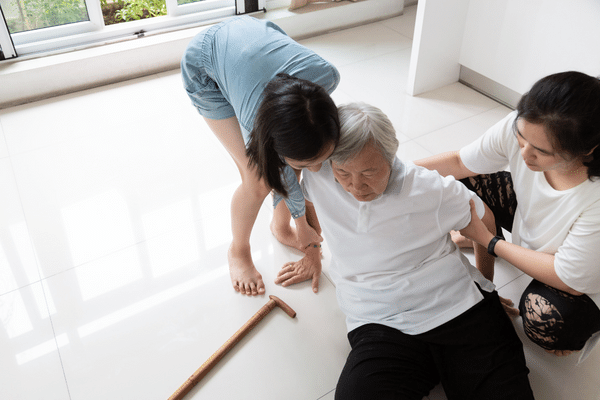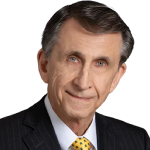|
|
Last Modified on Jun 19, 2025
Slip and fall accidents for elderly adults can often be severe and lead to even more serious outcomes. Unfortunately, they happen all too often. Many times, no one finds out that their loved one has fallen until an injury has occurred.
Most seniors want to remain living at home as they have always done, living independently and doing as they wish with all their own things surrounding them. But the lasting effects of a slip and fall accident can make it no longer possible. This is often the reason a senior is forced out of their home for good. It can be heart-wrenching and a hard decision for the family to make, but the safety of their loved one is a priority.
How Common Are Falls for Elderly Adults?
Unfortunately, falls are pretty common, and once an elderly adult has fallen, their chances of falling again doubles. Emergency rooms across the country treat millions of older adults each year and the injuries they have incurred from falls. The CDC estimates at least 300,000 elderly are hospitalized every year for hip fractures alone. Most of them usually occur from falling sideways.
It’s costing us a lot too! Accidental slips and falls are said to have cost $50 billion in the year 2015, with Medicare and Medicaid paying the bulk of the costs. Not something that we can keep up with. This is why falls are always such a big concern in hospitals and nursing homes. If a healthcare facility has too many falls, Medicare can shut them down.
Common Causes of Slips for Elderly Adults
A seemingly small slip or fall can be a major concern for an elderly adult. After all, they don’t bounce back as they used to in their youth. These slips and falls happen at home, the grocery store, a restaurant, or even a doctor’s office. You never know when they will happen or if help will be available. Some of the most common causes of slips and falls include:
- An uneven sidewalk
- Rough or imbalanced flooring
- Lack of handrails on stairs
- Uneven grass or other landscaping
- Poor lighting
Conditions that Increase the Risk of a Fall
Increased record-keeping and reporting have resulted in our added knowledge of the most common conditions that contribute to falls.
- Weakness
- Balance issues
- Foot pain
- Poor footwear
- Vitamin D deficiency
- Difficulty walking
- Medications (sedatives, antidepressants, etc.)
- Vision problems
The truth is most falls occur because of more than one risk factor. The more risks someone has, the higher their chances of falling are. Elderly adults that work with their healthcare provider can help minimize the potential risk factors associated with falls and can help protect themselves and others like them everywhere.
Lasting Effects for Slip and Fall Accidents
Of course, not all falls result in an injury. But often, they do. At the least, it can interfere with the confidence that older adults once felt in themselves and their abilities. If an injury does occur, the physical damage can make it tough to get around and do what is required to continue living on their own. Some of the lasting effects after a slip and fall may consist of the following:
- Broken bones – especially broken wrists, arms, ankles, and hips
- Head injuries – this type of injury can be especially serious. You should always see a medical professional if you have fallen and hit your head to ensure that a serious brain injury has not occurred.
- Anxiety – many seniors that have experienced a fall become quite anxious that it will happen again. This fear and anxiety may be limited to the amount of activity and movement the person is willing to do. Unfortunately, this lack of activity also worsens the situation as they become weak and unsteady, increasing their risk of falling again.
Doing Your Part to Prevent Falls
Falls can be prevented. With assistance from doctors, loved ones, and the seniors themselves, it is possible to remove many of the causes and conditions related to falls. Some of the things that can be done to reduce fall risks include:
- Talking to the senior’s physician about any conditions they or their caregivers are concerned about which could affect balance and walking abilities. Ask their medical provider to conduct a balance test and observe their risk for falling. They will have specific things that can be done to help.
- Have the senior’s doctor or a pharmacist review their list of medications to see if any could be clashing and making them feel unnecessary pain or weakness. Also, ask about the side effects of each medicine to see if they could contribute to the weakness or tiredness of the senior involved.
- Participate in strength training and balance exercises to help strengthen the legs of older adults.
- Get the senior’s eyes checked and see if they need a different prescription for their glasses.
- Improve the safety in areas of their home to reduce trip hazards, add light, reduce slipping, and add railings and other handrails in places like the bathroom.
Slip and Fall Accidents and Taking Legal Action
Slip and fall accidents can be serious, and proper safety precautions should be taken on people’s property, especially in public areas. If property owners are negligent in maintaining their property correctly and hazards to others exist, they should be held responsible.
The attorneys at Gainsburgh, Benjamin, David, Meunier & Warshauer, L.L.C. will help support seniors by doing just that. Getting the senior affected the compensation required to pay all bills is the goal. The burden of current and possible future medical expenses, lost wages, as well as pain and suffering they’ve gone through is unfortunate, all caused by negligence. Slip and fall accidents are dangerous, and extra care needs to be taken, especially with the elderly. Call (504) 522-2304 to learn more about the services we provide and how we can help your senior with their injury claim.





